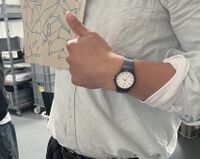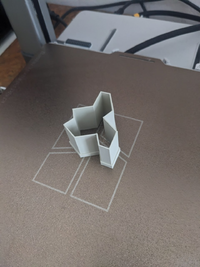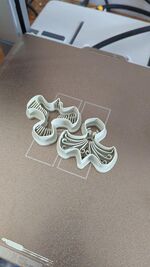Material&Process-25
Aus exmediawiki
Karin Lingnau, Dawid Liftinger, Camilo Sandoval
Overview
In Material & Process we are working on processes through the digital and the physical:
creating patterns and generative drawings, iterations and recombinations from the algorithmic (using p5), transferring digital patterns onto cut-out and printed patterns in various materials such as wood and rubber (laser cutters, stencils and stamps), printing and transferring onto materials in the next step, (re)arranging, reassembling and layering, working individually and collectively.
some examples and as a reference our last seminars on material & process
and
(page to be build up in the course of the seminar)
Seminar dates
always on Mondays, 14-16, every week
starting on 28th April 2025
Monday, 28.04.
introduction/ overview of the semester
what is material & process?
one example of material going through a process of transformation: using different technologies and stages, interdependence between material, tools, in processes: cookie cutter process
- MC Escher symmetry (more about that in the third week)
- food safe 3D printing materials
- create tesselations (one of several possibilities to try out tesselation patterns in a browser based application)
- Cookie Cutter 3D Printer (browser based applications for creating your own cookie cutter out of a drawing), features overview
Monday, 05.05.
overview iterations as a principle for patterns/ tesselations and its algorithmic use.
iterations: choosing a set of rules and applying it to your note book.

taking a first look at p5
check out references and the editor
--> create your own profile on the p5-site to be able to save your scripts
Monday, 12.05.
starting with p5
- a cheat sheet to help with the terms
- you can also download the cheat sheet in your preferred language
- for refreshing the editor page in p5: command-enter (mac)
- introduction to digital color
Monday, 19.05.
continuing and developing patterns with code and paper
Monday, 26.05.
continuing with coding, loops and patterns
super short introduction to lasercutter
Monday, 02.06.
introduction to lasercutter and first tests
eg engraving
continuing with p5 and your own patterns
working individually with p5 and lasercutter
Pfingstmontag / Whit Monday / 09.06.
no seminar
Monday, 16.06.
continuing with everything and experimenting more
collective drawing/ printing?
Monday, 23.06.
printing together, collaging, combining, creating new patterns
Monday, 30.06.
Monday, 07.07.
preparing and finishing exhibits for Rundgang
Monday, 14.07.
no seminar: Rundgang-week
For Rundgang supervision of the lab and exhibition is needed.
your own subpages
each one of you gets access to the wiki and their own userpage.
how to work with subpages
example page from another basic seminar: Sayaka
| Abonti | West | Seo | Shinyoung | Ronan |
| Helin | Seokhyeon | Justus | Sebastian | Jiwoo |
| Yubing | Sobae | Juyoung | Luca | Hosung |
| Camilo | visible unicorn |
Seminartext
The basic seminar material & process aims to examine materials and material processes, in interaction with technologies and their aesthetics, in a personal and social context. The basis of every artistic work is material, whether haptic and physical as material, carrier and medium or/and structural and immaterial as coding. The consideration and examination of the interdependencies of material in their fundamental principles, in their translations and overlaps between the digital and the physical, will be carried out in the seminar through experiments and material studies. Material processes and algorithmic sequences are part of practical exercises and theoretical introductions. The focus is on observing and getting to know material as an independent element, as well as on working with materials and their processes. Students can develop their own experiments and models using basic techniques and existing equipment. Analog materials and tools for processing material on a digital and mechanical level (e.g. CNC production such as laser cutters, milling machines or printing techniques such as Riso) are available. The principles discussed in the seminar can become the basis for works and concepts on a sculptural and/or digital level.

